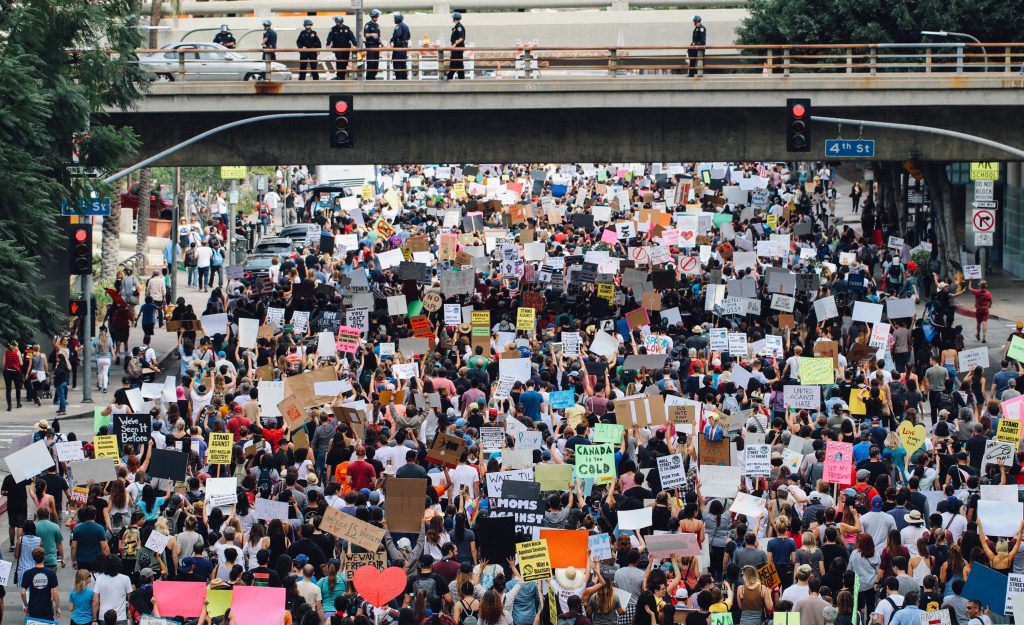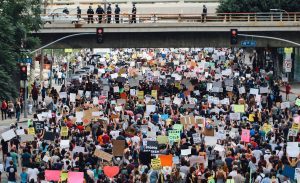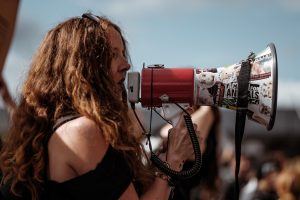To Protect Democracy We Must Catalyze New Partnerships
Nuevas Alianzas para Proteger la Democracia
As we mark World Democracy Day on September 15th, it’s worth asking the question: Did democracy have a good year? From what you’re reading, watching or listening to, it might seem as though the answer is no—that democracy is failing in many regions. Luckily there are signs that democracy is actually gaining ground in several regions of the world.
In their 2019 Democracy Report, the Varieties of Democracy Institute highlights that 21 countries have made advancements in democracy in the past decade. These include pro-democracy movements that have mobilized thousands of citizens in Algeria, Armenia, Burkina Faso, Georgia, Kyrgyzstan, Slovakia, Tunisia and Sudan. Additional indicators show that there is much to be hopeful about. For example, the Afrobarometer found that more than 67% of Africans reject nondemocratic forms of government and the Pew Research Center survey found that 66% of those surveyed believe that direct democracy would be the preferable form of government.
With signs that support for democracy is on the rise it is even more important to take action to ensure democracy is healthy and solid. One clear antidote to rollbacks in democracy is the protection of a vibrant civil society space where citizens are free to speak out and hold institutions to account. That’s why it’s even more important during turbulent times to lean into international partnerships, like OGP, that seek to elevate the voices of citizens and bridge the gap between the government and civil society and other key stakeholders, like the private sectorGovernments are working to open private sector practices as well — including through beneficial ownership transparency, open contracting, and regulating environmental standards. Technical specificat... More.
The protection of civic space and civic rights is crucial to both democracy at large and the process to open governments. Nearly half of OGP member countries have made commitments to protect civic space—and they have work to do to strengthen those included in their national and local action plans.
According to OGP’s Global Report, in 48% of OGP member countries, freedom of assemblyPeaceful assembly — a fundamental human right — is essential to healthy and effective democratic institutions. Technical specifications: Protection of the individual right to peacefully assemble, ... More remains a problem due to lack of access to funding, taxPlacing transparency, accountability, and participation at the center of tax policy can ensure that burdens are distributed equitably across society. Technical specifications: Commitments related to c... regulations, and barriers to entry. And 58% of OGP member countries reported issues related to harassment of activists and journalists. To address this trend more systematically, it is crucial for OGP member governments to include specific commitments in their action plans to protect civic space and the basic rights of citizens and ensure these barriers to democracy do not persist.
Civil society isn’t the only actor expressing concern over growing threats to its ability to drive change and democractic freedoms. The business community has begun to speak out on this issue and recognize that a strong civil society and basic civic freedoms are key to a healthy business environment. For business, these threats to civil society and basic rights translate to weakened legislative systems, unstable markets and disruption to critical infrastructure, such as internet access and uncertainty in their social license to operate. Protecting civic rights should also be in the interest of governments and companies concerned with a country’s long-term economic growth outlook.

Protest in Los Angeles, United States Photo by Alex Radelich/UnsplashPHOTO: Unsplash
To tackle these tough issues, OGP must forge new partnerships with actors aligned on protecting basic rights. OGP can be a trusted platform for exchange between business, civil society, and governments on protecting civic space and civic rights in addition to issues around anti-corruption, increased transparencyAccording to OGP’s Articles of Governance, transparency occurs when “government-held information (including on activities and decisions) is open, comprehensive, timely, freely available to the pub... More, and better governance.
We have learned at the B Team that companies are increasingly seeking spaces where they can actively engage with civil society on these issues. We’ve worked with the Business and Human Rights Resource Centre and International Service for Human Rights to develop this space with the Business Network on Civic Freedoms and Human RightsAn essential part of open government includes protecting the sacred freedoms and rights of all citizens, including the most vulnerable groups, and holding those who violate human rights accountable. T... Defenders. This group brings together more than 25 major multinational companies with human rights experts and international agencies for trusted discussion and action.
As a participant in the Business Network, Microsoft brought its perspective as a multinational to the Sixth OGP Global Summit held in Ottawa. Microsoft joined the Canadian government and local and international human rights organizations to openly discuss the struggles civil society is facing amidst these crackdowns and the role of business leadership in preventing attacks on civic right and activists. Microsoft and the Canadian government discussed their work together on the Freedom Online Coalition—an effort to support internet freedom with a focus on free expression, association, assembly and privacy online. Examples like this highlight how the private sector could play a thoughtful role in the OGP process as key stakeholders in the success of action plans.
We are living in the most democratic moment in the last century, with 55% of the world’s countries using some form of democratic governance. Nevertheless, we must safeguard and grow our democratic institutions. To do this we must build new partnerships to ensure the preservation of good governance, open democracies and accountable institutions.
At its core, democracy is about people. On World Democracy Day and beyond, cross-sector collaboration can help secure their right to be equal participants in shaping their future and forming the foundation needed for sustainable development.
En el marco de la celebración del Día Internacional de la Democracia el 15 de septiembre, vale la pena preguntarnos: ¿Éste fue un buen año para la democracia? Por lo que leemos, vemos y escuchamos, parecería que la respuesta es que no, que la democracia está fallando en muchas regiones. Por suerte, hay algunas señales que demuestran que, de hecho, la democracia está ganando terreno en varias regiones del mundo.
En el Informe de Democracia 2019, Varieties of Democracy Institute demuestra que 21 países han fortalecido su democracia en la última década. Ejemplo de ello son los movimientos pro-democracia que han movilizado a miles de ciudadanos en Argelia, Armenia, Burkina Faso, Georgia, Kirguistán, Eslovaquia, Túnez y Sudán. Otros indicadores muestran que hay muchos datos esperanzadores. Por ejemplo, el Afrobarómetro demostró que más del 67% de los africanos rechazan las formas no democráticas de gobierno y una encuesta del Pew Research Center encontró que el 66% de los encuestados creen que la democracia directa es la forma de gobierno preferida.
En el contexto de la tendencia de la democracia al alza, cobra importancia tomar medidas para asegurar que la democracia es sólida. Un antídoto claro a los retrocesos en la democracia es la protección del espacio cívico en el que los ciudadanos tienen la libertad de expresarse y exigir que las instituciones rindan cuentas. Es por ello que es aun más importante durante los tiempos difíciles apoyarse en las alianzas internacionales, tales como OGP, que buscan elevar la voz de los ciudadanos y cerrar la brecha que existe entre el gobierno y la sociedad civil y otros actores clave como el sector privado.
La protección del espacio cívico y los derechos cívicos es clave para la democracia y para el proceso de apertura de los gobiernos. Cerca de la mitad de los miembros de OGP han establecido compromisos para proteger el espacio cívico – y tienen que trabajar en fortalecer los compromisos que han incluido en sus planes de acción locales y nacionales.
Según el informe global de OGP, en 48% de los países de OGP, aún hay retos alrededor de la libertad de asamblea debido a la falta de acceso a fondos, regulaciones fiscales y barreras de entrada. Además, el 58% de los miembros de OGP reportaron que tienen problemas de acoso a activistas y periodistas. Para abordar esta tendencia de forma sistemática, es importante que los miembros de OGP incluyan compromisos específicos en sus planes de acción para proteger el espacio cívico y los derechos fundamentales de los ciudadanos y ayudar a eliminar las barreras a la democracia.
La sociedad civil no es el único actor que ha expresado su preocupación por las amenazas a su capacidad de impulsar las libertades democráticas. El sector privado también ha empezado a pronunciarse sobre este tema y reconocer que la sociedad civil fortalecida y las libertades cívicas son clave para generar un ambiente favorable para el sector privado. Para las empresas, estas amenazas a la sociedad civil y a los derechos básicos se traducen en sistemas legislativos debilitados, mercados inestables y alteraciones a la infraestructura como el acceso a internet e incertidumbre en su licencia social para operar. La protección de los derechos cívicos debe ser una prioridad de los gobiernos y de las empresas que se preocupan por el crecimiento económico de largo plazo de un país.

Protest in Los Angeles, United States
Photo by Alex Radelich/Unsplash
Para abordar estos problemas, OGP debe crear nuevas alianzas con actores que buscan proteger los derechos cívicos. OGP puede ser una plataforma de intercambio entre las empresas, la sociedad civil y los gobiernos para la protección del espacio cívico y los derechos cívicos en temas de anticorrupción, transparencia y gobernanza.
En The B Team, hemos aprendido que las empresas están buscando espacios para colaborar con la sociedad civil en estos temas. Hemos trabajado con Business and Human Rights Resource Centre y con International Service for Human Rights en el desarrollo de este espacio con la red de empresas sobre libertades cívicas y defensores de los derechos humanos. Este grupo reúne a más de 25 empresas multinacionales con expertos en derechos humanos y agencias internacionales para discutir temas y tomar medidas.
Como miembro de la red, Microsoft presentó su perspectiva como empresa multinacional en la sexta Cumbre de OGP que se llevó a cabo en Ottawa. Microsoft se reunió con el Gobierno de Canadá y un grupo de organizaciones locales e internacionales de derechos humanos para discutir los problemas que enfrenta la sociedad civil en el marco de las acciones de mano dura y el papel que tienen las empresas para evitar ataques a los derechos cívicos y los activistas. Microsoft y el Gobierno de Canadá discutieron su trabajo conjunto sobre la Freedom Online Coalition – un esfuerzo que buscar apoyar la libertad en línea con un enfoque en la libertad de expresión, asociación, asamblea y privacidad en línea. Ejemplos como este demuestran que el sector privado puede tener un papel importante en el proceso de OGP como actor clave en el éxito de los planes de acción.
Estamos viviendo el momento más democrático del último siglo, pues en el 55% de los países del mundo se ha establecido alguna forma de gobernanza democrática. Sin embargo, debemos trabajar en salvaguardar y fortalecer nuestras instituciones democráticas. Para ello, es necesario establecer nuevas alianzas para asegurar la conservación de la gobernanza, las democracias abiertas y las instituciones que rinden cuentas.
Al final, la democracia es para la gente. En el Día Internacional de la Democracia y más allá, la colaboración intersectorial puede ayudar a asegurar su derecho a definir su futuro y establecer el fundamento necesario para el desarrollo sostenible.


Leave a Reply